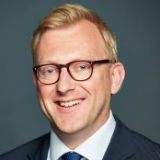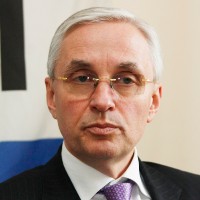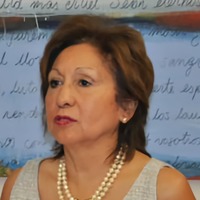Russia’s military assault on Ukraine defies international law and poses one of the most alarming challenges to European security in the post-Cold War era, with ripple effects far beyond the continent. In this Council of Councils global perspectives series, four experts analyze the implications for Russia, Europe, and the world.
Putin’s Endgame: Europe Should Prepare for an Even Worse Scenario
Russia’s premeditated war against Ukraine is without any justification whatsoever. In defiance of international appeals for a peaceful resolution, warnings about severe consequences, and the adoption of a tidal wave of sanctions, Russian President Vladimir Putin has not been deterred. His full-blown invasion of a sovereign European nation is nothing more than a flagrant act of aggression and a blatant violation of international law.
Crippling sanctions are the right response now and some credence can be given to the argument of incrementalism, whereby the European Union keeps certain sanctions up its sleeve in case of further escalation. It is morally right for EU countries to provide any and all support they can muster to help Ukraine resist the invaders. The European Union itself has crossed a Rubicon by providing direct military support to the Ukrainian army.
The prospect of a full Russian occupation of Ukraine and the installation of a puppet regime is a distinct possibility. It cannot be emphasized enough just how much Putin’s warped interpretation of history, great deception, and criminal actions are a direct existential threat to a European security order that has prevailed for more than thirty years since the end of the Cold War.
Putin is the problem and should not be part of the solution in defining a future European security architecture. With his unprovoked war against Ukraine and unveiled threats against other European countries, Putin has entered his endgame. He sits atop a crumbling pyramid of power. That’s why the West needs to be prepared for the worst. Reinforcing NATO’s eastern flank is of vital importance to prevent any Russian attacks against other parts of Europe.
The invasion of Ukraine is the last call for the European Union to end its gas dependency on Russia and make a success of its European Defence Union. Guided by a new Strategic Compass, the European Union will have to contain the criminal regime in the Kremlin. In the face of such evil, it is essential that EU member states remain united.
A World Power in a Mammoth Trap
The "special military operation" (if we use the Kremlin's wording) launched by Moscow on February 24 will have a profound effect on global governance, European security, and, of course, the future of Ukraine.
It is too early to be certain about Russia's future in light of the current events. First, Russia will be exposed to more external pressure. International institutions, national governments, non-governmental organizations, and people around the world have reacted to the events. These reactions are only just beginning to translate into specific measures. It is obvious that the effect of new measures on Russia's economy, its citizens, and its very place in international affairs will be much greater than what we saw in 2014–21. In those seven years, Russia has demonstrated that it is capable of mobilizing politically and economically in response to sanctions. Its economy has remained stable, while society and businesses have been willing to tolerate prolonged stagnation and abandon the prospects of development and growth of prosperity. And it seems that the limit of this tolerance can only be determined by trial and error.
Second, this large-scale armed conflict in Eastern Europe has clearly illustrated that the internal checks and balances, upon which the interactions of world powers have relied on for the past seventy-five years (including conflicts), do not have the desired effect on the current Russian leadership. Neither the experts nor the authorities should be overly confident that no further world-shattering actions will be undertaken.
While the quality of Russia's military strategy and planning can be only evaluated later, its poor political planning is already evident. The task of keeping Ukraine under control could be carried out in various forms (and it was often successfully realized in some periods of post-Soviet history). But the "demilitarization" and "denazification" efforts announced by Moscow can only be accomplished through occupation. To abandon the occupation would now mean to surrender potentially the only effective tool of control. Russia has willingly entered a mammoth trap of its own making—an enormous waste of resources and an inability to achieve its national interests anywhere outside the occupation zone.
Furthermore, Moscow's reliance on Beijing is growing considerably. The People's Republic of China remains the only stable and large external market for Russia and its only source of advanced technologies. But these new conditions made this relationship a deadly poison for the Chinese.
As of now, Russia is gradually turning from an actor into only a factor in efforts for a new kind of global resilience and sustainability. The events of February 2022 have become the strongest evidence for that. Seeing these events unfold from the vantage point of Moscow, one can only hope that no more drastic measures and radical steps will be taken.
Copernican Revolution in European Politics
The Russian president has gone mad. No rational calculation justifies his illegal and deadly attack on Ukraine. His twisted historical dream of making Ukraine “Russian” again is as if France attacked the United States to get Louisiana back.
The preposterousness of Putin’s attack makes his blatant irrationality visible for the first time, not only to governments in Europe, but also to many people around the world. The past century of European history flashes before our eyes anew.
The war in Ukraine has refreshed and revived memories of the great wars that destroyed our European lands not even a century ago. The stories of our grandparents and great grandparents who fled East from one army and then West from another, had their homes leveled, and were gassed in concentration camps throughout Central Europe sound in our ears again—just in time, before we were about to forget. The fear of the atom bomb—the terrifying companion of the generations born between the Second World War and the 1970s—is back too. As if that weren’t enough, one of the first places Russia took control in Ukraine was Chernobyl—a symbol of existential danger for the 1980s generation.
It is because of these undercurrents of European generational memory on the one hand, and the arrogant absurdity of this war on the other, that Europe, the European Union in particular, is turning its policy around in what ultimately may be a Copernican revolution in politics. The president of the European Commission, Ursula von der Leyen, announced that, for the first time in history, the European Union would purchase and deliver military equipment worth five hundred million euros to a country under attack, and not even an EU member state. The same amount will be delivered in humanitarian aid. Many Russian banks will be removed from the SWIFT international payment system and vast individual and systemic sanctions were put in place. The European Union imposed larger sanctions than NATO members and Ukraine may now have a viable prospect of joining the European Union, while Europe truly becomes a united, autonomous global player. Germany made a similar 180 degree turn, announcing a gigantic increase in military expenditures of one hundred billion euros, surpassing the NATO goal of spending 2 percent GDP on defense, suspending Nord Stream 2, and delivering military equipment to Ukraine.
For Poland, the most remarkable result of this war so far is the immense and unprecedented societal mobilization to help Ukrainians. Almost half a million Ukrainians have already arrived, on top of the two million who already live and work in Poland. Such compassion may ultimately change the image of Poland as a migrant-averse society because Poles are not homogenous and, like many other societies, split half and half. The empathic half is now vocal and ready to help.
In My Struggle, considered a barometer of contemporary Europe, the Norwegian author Karl Ove Knausgaard wrote that “never has a society been further from revolution as our own." Thanks to the war in Ukraine, a European political revolution may now be well underway. Although the price for it will be most likely paid in Ukrainian blood.
From “Little Green Men” to Green Helmets
In March 2014, hundreds of “little green men” (soldiers without any national identification) surrounded Ukrainian barracks in Crimea and forced the local parliament to declare the Autonomous Republic of Crimea, an integral part of Ukraine, independent. Russian President Vladimir Putin ultimately acknowledged that they were, in fact, Russian soldiers.
Eight years later, preceded by “special military operations” in neighboring Belarus and along the eastern border, thousands of Russian soldiers have invaded Ukraine, this time with the aim of taking the whole country.
Putin’s actions have gone from conceit and delusion to open defiance and threat, and are a blatant violation of the main principles that the Charter of the United Nations enshrines.
But they are not unrelated facts—they belong in a series of actions taken by Putin in the pursuit of a broader strategy, oriented to modify the transatlantic security architecture. It also serves an even more ambitious purpose: to recover the imperial power of the Russia empire and place it in a prominent place in a multi-polar world.
The real surprise is not what Putin did, although nobody expected the actual scope of military aggression, but instead what the West did not see, did not adequately evaluate, or was not prepared to admit.
On one hand, the West suffered from too many misperceptions and opportunities lost. And on the other hand, a czarist-minded leader was able to seize each of them.
It is not that Putin did not give enough warnings of his ultimate intentions. His words and actions since the early 2000s should have rung alarm bells: his merciless repression of the Chechen revolt in 1999–2000, the Georgian war in 2008 that resulted in two new Republics of Abkhazia and South Ossetia, the renewal, in 2010, of the Black Sea Red Fleet lease until 2042, the annexation of Crimea by “little green men” in 2014, the amendments to the Russian Constitution in 2020, the distribution of Russian passports in neighboring countries, the demand that NATO and the United States reform the European security architecture in December 2021, and the recognition of the auto-proclaimed republics of Donetsk and Lugansk in February.
So now we have “green helmets” all over Ukraine, threatening its independence, even its very existence.
The West, as well as other world powers, need to heed the lessons of two decades of Putin in power and adopt an effective strategy to prevent more “little green men” elsewhere in the future.










